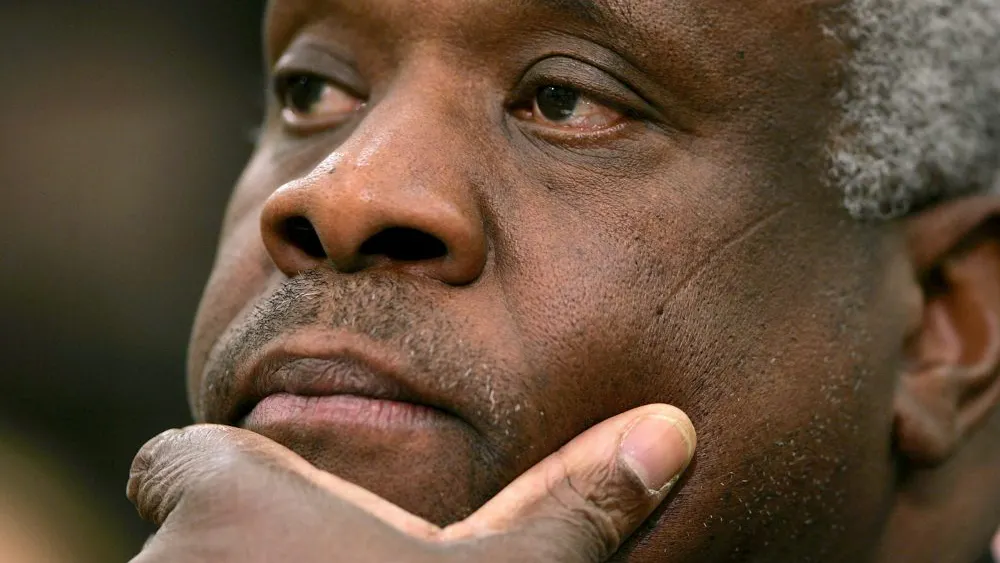In Wednesday’s oral arguments before the Supreme Court of the United States on the monumental Dobbs v. Jackson Women’s Health Organization, Justice Clarence Thomas questioned the U.S. Solicitor General Elizabeth Prelogar, asking if she could point to what specific right Roe v. Wade protects in the Constitution, comparing the request to the “right to bear arms” found in the Second Amendment.
According to RealClearPolitics, Justice Thomas asked, “Would you specifically tell me, specifically state, what the right is? Is it specifically abortion? Is it liberty? Is it autonomy? Is it privacy?”
“The right is grounded in the liberty component of the 14th Amendment, Justice Thomas,” Prelogar stated. “But I think it promotes interests in autonomy, bodily integrity, liberty, and equality. I think it is specifically the right to abortion here, the right of a woman to be able to control without the state forcing her to continue a pregnancy whether to carry that baby to term.”
“I understand we are talking about abortion here,” Thomas rebutted. “But what is confusing is that we — if we were talking about the Second Amendment, I know exactly what we are talking about. If we’re talking about the Fourth Amendment, I know what we’re talking about because it’s written. It is there. What specifically is the right here that we are talking about?”
“Well, Justice Thomas, I think that the court in those other contexts, with respect to those other amendments, has had to articulate what the text means and the bounds of the Constitutional guarantees,” Prelogar tried to explain. “And it has done so through a variety of different tests that implement First Amendment rights, Second Amendment rights, and Fourth Amendment rights.”
“I don’t think there is anything unprecedented or anomalous about the right that the court articulated in Roe and Casey, and the way it implemented that right by defining the scope of the liberty interest by reference to viability and providing that’s the moment when the balance of interest tips and when the state can act to prohibit a woman from getting an abortion, based on its interest in protecting fetal life,” she added.
“So the right, specifically, is abortion?” Thomas responded.
“The right of a woman, prior to viability, to control whether to continue with a pregnancy, yes,” Prelogar answered ending the questioning.
Of course, pro-abortion advocates have long argued that Roe protects the right to privacy, which supposedly includes the ability to have an abortion. So, the heart of the matter is that Thomas is trying to understand what specific right is the government supposedly protecting in keeping abortion past 15-weeks legal, which is the Mississippi law that Jackson is challenging.
The Post Millennial surmised that was the reason this line of questioning was asked by Justice Thomas several times.
Thomas pointed out possible confusion earlier in the arguments when asked attorneys argue on behalf of Jackson: “If I know your interest here is in abortion. I understand that. But if I were to ask you what constitutional right protects the right to abortion? Is it privacy, is it autonomy? What would it be?”
“It’s liberty, your Honor. It’s the textual protection in the 14th Amendment that a state can’t deprive a person of liberty without due process of law, and the Court has interpreted liberty to include the right to make family decisions and the right to physical autonomy including the right to end a pre-viability pregnancy,” the attorneys responded.
“So it’s all of the above,” Thomas continued. “But what I’m trying to focus on, is if we, to lower the level of generality, or at least be a little bit more specific. In the old days, we used to say it was a right to privacy that the court found in the due process, substantive due process clause. Okay. Or in substantive due process, and I’m trying to get you to tell me what are we relying on now? Is it privacy? Is it autonomy? What is it?”
“I think it continues to be liberty,” the attorneys responded, “and the right exists whatever level of generality the court applies. There was a tradition under the common law for centuries of women being able to end their pregnancies. But in addition, when it comes to decisions related to family, marriage and childbearing, the court has done the analysis at a higher level of generality. And that makes sense, because otherwise the Constitution would reinforce the historical discrimination against women.”
Legal observers who heard the arguments in full — including CNN’s Jeffrey Toobin — asserted the arguments overall for the pro-abortion were — to put it lightly — a complete failure.
“If you believe that women should have the right [to] choose abortion, today’s Supreme Court argument was a wall-to-wall disaster,” Toobin tweeted.
If you believe that women should have the right choose abortion, today’s Supreme Court argument was a wall-to-wall disaster.
— Jeffrey Toobin (@JeffreyToobin) December 1, 2021

.png)
.png)

